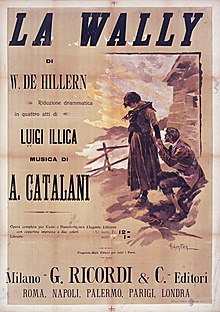
Back والى (عمل اوبرالى فى ايطاليا) ARZ La Wally Catalan La Wally Czech La Wally German La Wally Spanish La Wally Finnish La Wally French La Wally Italian La Wally Dutch La Wally Portuguese
| La Wally | |
|---|---|
| Opera by Alfredo Catalani | |
 Cover of the vocal score published by Ricordi | |
| Librettist | Luigi Illica |
| Premiere | 20 January 1892 La Scala, Milan |
La Wally is an opera in four acts by composer Alfredo Catalani, to a libretto by Luigi Illica, first performed at La Scala, Milan, on 20 January 1892. It was Catalani's last opera.[1]
The libretto is based on a hugely successful Heimatroman by Wilhelmine von Hillern (1836–1916), Die Geier-Wally, Eine Geschichte aus den Tyroler Alpen (The Vulture Wally: A Story from the Tyrolean Alps). Wally, short for Walburga, is a girl with some heroic attributes. The story is based on an episode in the life of Tyrolean painter Anna Stainer-Knittel, whom von Hillern met. She got her epithet "Geier" (vulture, the local name for eagle) from having gutted a bearded vulture's nest going down a rope; this dangerous task, aimed at protecting the sheep in the Alpine village, was typically performed by a man.
Von Hillern's piece was originally serialized in Deutsche Rundschau and was reproduced in English as "A German Peasant Romance"[2] in the Cornhill Magazine in 1875.
The opera is best known for its aria "Ebben? Ne andrò lontana" ("Well, then? I'll go far away," act 1, sung when Wally decides to leave her home forever). American soprano Wilhelmenia Fernandez sang this aria in Jean-Jacques Beineix's 1981 movie Diva – a performance at the heart of the thriller. Catalani had composed this aria independently as "Chanson Groënlandaise" in 1878 and later incorporated it into his opera.
The opera features a memorable operatic death in which the heroine throws herself into an avalanche. It is seldom performed, partly because of the difficulty of staging this scene, but Wally's principal aria is still sung frequently.
- ^ Giorgio Bagnoli (1993). The La Scala Encyclopedia of the Opera. Simon and Schuster. p. 368. ISBN 9780671870423.
- ^ "A German Peasant Romance", The Cornhill Magazine, vol. 32, July 1875